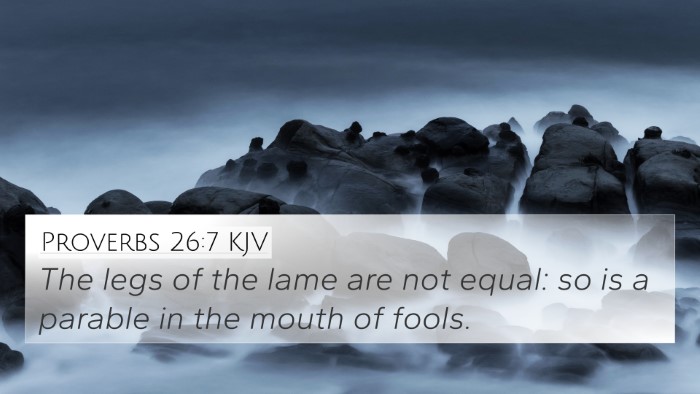Understanding Proverbs 17:7
Proverbs 17:7 states: "Excellent speech becometh not a fool: much less do lying lips a prince." This verse highlights the significance of speech and the character of individuals in their use of words. By examining public domain commentaries, we can glean deeper insights into its meaning.
Summary of Key Insights
- Matthew Henry's Commentary:
Matthew Henry points out that the verse contrasts the speech of fools with the expected eloquence of those in authority. It suggests that fools are typically characterized by poor and foolish speech, highlighting a moral expectation for those in positions of influence to speak wisely and truthfully.
- Albert Barnes' Commentary:
Albert Barnes emphasizes the idea that the manner of speech reflects one's character. Fools, who are often rash and unwise, are unsuitable for honorable speech. It further underlines the dishonor that comes from deception, especially in leaders, as they are held to a higher standard of integrity.
- Adam Clarke's Commentary:
Adam Clarke elaborates on the idea that this verse teaches us about the importance of speech being appropriate to one’s character and station in life. He interprets lying lips, specifically in the case of a prince, as particularly foul, since they betray the trust of those under their authority.
Connections to Other Bible Verses
This verse can be cross-referenced with several other biblical texts that reinforce its themes. Here are notable connections:
- Proverbs 10:31-32: "The mouth of the just bringeth forth wisdom: but the froward tongue shall be cut out." - This verse also emphasizes the contrast between wise speech and foolishness.
- James 3:10: "Out of the same mouth proceedeth blessing and cursing. My brethren, these things ought not so to be." - It speaks to the inconsistency of speech.
- Proverbs 12:22: "Lying lips are abomination to the Lord: but they that deal truly are his delight." - A clear linkage to the consequences of deceitful speech.
- Titus 1:7: "For a bishop must be blameless, as the steward of God; not self-willed, not soon angry, not given to wine, no striker, not given to filthy lucre." - This emphasizes the moral standards expected from leaders.
- Matthew 12:36: "But I say unto you, That every idle word that men shall speak, they shall give account thereof in the day of judgment." - A reminder of the accountability of one’s speech.
- Isaiah 32:5: "The vile person shall be no more called liberal, nor the churl said to be bountiful." - This implies a change in how people will be viewed when they act contrary to their character.
- Philippians 4:8: "Finally, brethren, whatsoever things are true, whatsoever things are honest, whatsoever things are just..." - A call to focus on speech that aligns with truth and integrity.
Thematic Analysis
The themes of integrity, wisdom, and appropriate speech manifest throughout the Bible. Proverbs 17:7 serves as a reminder that speech is not merely a means of communication but a reflection of one’s character. The character of leaders, in particular, is of utmost importance, as their words can shape the lives and beliefs of many.
Tools for Bible Cross-Referencing
Understanding the connections between Bible verses can be enhanced using various resources:
- Bible Concordance: A valuable tool to find words and references throughout the Bible.
- Bible Cross-Reference Guide: A specific guide that provides related passages for thematic studies.
- Cross-reference Bible Study: Techniques that help in tracing themes and topics across the scriptures.
Conclusion
This exploration of Proverbs 17:7 indicates that excellent speech is integral to a person's character, especially for those in positions of authority. By examining its meaning through the lens of trustworthy commentaries, we can appreciate the importance of integrity in our communication. As we strive for wisdom in our speech, we should remember the broader context of biblical teachings that call us to truth and righteousness.
Further Study Suggestions
To deepen your understanding of Proverbs 17:7, consider:
- Conducting a Comparative Bible Verse Analysis with the verses provided above.
- Utilizing a Cross-reference Bible study approach to discover themes related to leadership and speech.
- Exploring Bible reference resources for more insights on the implications of speech and truth in your daily life.











